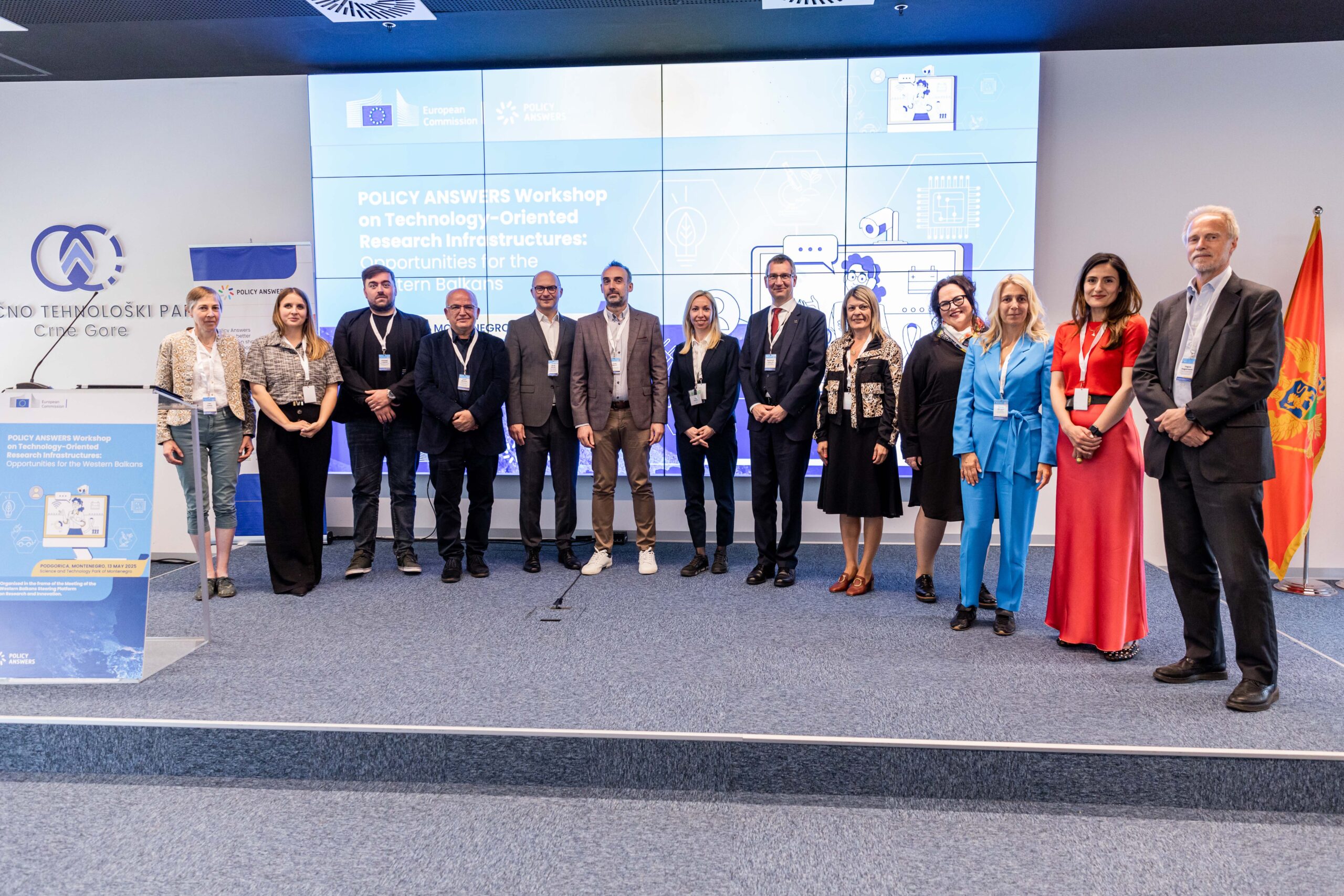As part of its mission to foster innovation and inclusive growth in Southeast Europe, the POLICY ANSWERS project convened a high-level workshop on 13 May 2025 in Podgorica, Montenegro, focused on Technology-Oriented Research Infrastructures (TORIs). Held alongside the Meeting of the Western Balkans Steering Platform on Research and Innovation, the event spotlighted TORIs as essential tools for unlocking the region’s potential in digital transformation, green transition, and talent retention. Through keynote speeches, expert panels, and cross-sector dialogue, the workshop offered practical insights and regional strategies to shape the future of research infrastructures in the Western Balkans.
Session 1: Innovation and Technology Transfer for Sustainable Growth
The first session featured four inspiring speakers who highlighted successful European models for innovation and technology transfer:
- Djerdj Horvat from Fraunhofer ISI explained how Fraunhofer became Europe’s top applied research organisation by bridging fundamental research and market application. He noted the Western Balkans’ need for better knowledge transfer mechanisms to boost innovation.
- Mirka Gottberg from Finland’s VTT Research Centre demonstrated how technology infrastructures and public-private partnerships help bring science to market, suggesting VTT’s model as a blueprint for the Western Balkans.
- Domagoj Crnkovic from Croatia’s PISMO Incubator showcased Novska’s transformation into a gaming industry hub through education, local investment, and EU funds, proving small towns can drive digital innovation.
- Nevena Radomirovic from Serbia’s ElevenEs presented Europe’s first LFP battery cell manufacturer outside China. From a lab to a gigafactory, ElevenEs exemplifies how green-tech start-ups can scale and support the EU’s energy goals.
Session 2: Building Innovation Ecosystems in the Western Balkans
The second session spotlighted key regional and international actors driving innovation infrastructure, policy reform, and talent retention across the Western Balkans:
- Sinisa Marcic of the RCC provided a regional landscape of innovation infrastructures, from Albania’s Durana Tech Park to Serbia’s BIO4 Campus. Despite ongoing challenges—low R&D investment, brain drain, and regulatory gaps—he highlighted clear opportunities: enhanced regional cooperation, youth engagement, and stronger alignment with EU digital strategies.
- Vesna Bengin of Serbia’s BioSense Institute showcased how balanced investment in infrastructure and human capital can drive real impact. With 200 researchers and €32 million in funding, BioSense is reversing brain drain, transforming agriculture through digital technologies, and catalysing national-level science policy reforms.
- Lejla Gurbeta Pokvic of Bosnia and Herzegovina’s Verlab Institute shared how a private institute grew into a digital innovation hub in just three years. By supporting SMEs, advancing digital literacy, and building HPC infrastructure, Verlab is a powerful example of bottom-up innovation in a challenging environment.
- Arben Merkoci presented the NANOBalkan initiative, modelled after Spain’s ICN2, aiming to create a regional nanotechnology excellence centre in Albania. With partners across the Balkans and EU, the initiative seeks to bridge advanced research with cross-border collaboration and sustainability.
- Lisa Cowey of Oxford’s Technology Transfer Interface emphasised the need for new investment models that support smaller, innovation-led infrastructures like BioSense and PISMO. She argued for flexible public-private funding mechanisms that better reflect the long-term, non-linear returns of such ecosystems.
The Workshop on Technology-Oriented Research Infrastructures in the Western Balkans was more than a gathering of experts, it was a pivotal moment in aligning regional ambition with European innovation policy. By fostering dialogue between policymakers, researchers, and industry leaders, the event helped shape a common understanding of how Technology-Oriented Research Infrastructures can drive sustainable development, talent retention, and cross-border cooperation. The insights generated during the sessions have already begun informing EU-level strategic planning, marking a concrete outcome of this regional effort. A detailed report and a video highlight of the event can be found below.

